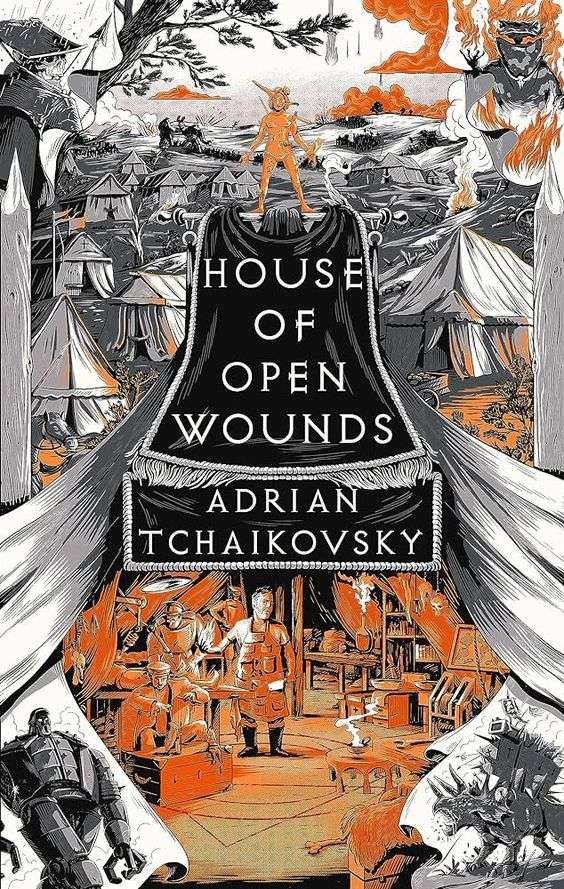House of Open Wounds by Adrian Tchaikovsky
Head of Zeus, hb, £19.99
Reviewed by Sarah Deeming

In the Palleseen Empire’s quest to bring the world into their definition of order, their armies scour the lands for superstitions to irradicate. When the non-Palleseens fight back, the injured soldiers need healing and are taken to the Butcher and his team of medicos for healing. They can deal with everything from broken bones to scorched flesh and blindness because these medicos are the priests and servants of the superstitions the Pals are trying to destroy. This is where Yasnic, God’s ex-priest and healer, finds himself after he is arrested for smuggling forgotten gods out of conquered cities. But this is not Yasnic’s natural environment, the blood, the burning, the broken bodies. His natural inclination is to heal, but his healing comes at a price that a soldier can’t pay: never doing harm again. As unwanted attention falls on Yasnic and his comrades in the medico unit, and it may not be the war that kills Yasnic but the people he is trying to help.
House of Open Wounds is the second book following Yasnic, the one and only follower of God and the Palleseen Empire, who don’t like his sort of magical nonsense; it makes the place untidy. It opens with a punch in the medico tent with the Butcher, a monster of a man who triages everyone who comes into the tent. It is a shocking opening, with the Butcher coldly assessing injuries and sorting people into those needing immediate help, those who can wait for healing and those beyond help. It hooks you into the rest of the story, which does not let up throughout, building tension with graphic descriptions of the horror of warfare, not from the point of view of the soldiers but the people trying to put the soldiers back together.
We delve deeper into Yasnic’s religion and see it from God’s point of view. Yasnic, nicknamed Maric by the Pal’s, can’t help but try and heal the soldiers, but keeping the strict “do not harm to others†condition of the healing is hard for a soldier, and when one dies, Yasnic begins to understand why God doesn’t heal everyone even though he could. But Lidlet, a healed soldier, sets about understanding the rules that now bind her and has a far greater understanding of the religion she is beholden to. The juxtaposition between Lidlet’s and Yasnic’s attitudes to religion is fascinating and keeps the story moving outside the action sequences.
Focusing on the army’s healers is a unique selling point for this book, as they are an underrepresented character set in novels, and these are a ragtag group of individuals who are all in the army for different reasons. Some of them are hiding their gods from the Pals, others feel obliged to save lives, and others are pressed ganged, like Yasnic, to heal or be killed. We also meet officers in the army who skirt on the edge of Palleseen acceptability: a necromancer, a man who drains magical objects of their power to charge other items, and someone who negotiates contracts with demons. Technically, these are not acceptable Palleseen traits; their specialities are too messy for Pal sensibilities, yet they are willing to do what it takes to get the job done. I can’t help but think there is a commentary about armies in general in Tchaikovsky’s portrayal.
My favourite character was a healer called Alv. She can take someone else’s injuries onto herself and then rapidly heal herself, sometimes in minutes, sometimes longer, depending on the injury. She keeps herself aloof from the other medicos while craving their companionship. She is quite a meek character, focused on maintaining balance and not getting involved in any of the politics naturally found in any workplace until the Pals force her to choose a side, and then Alv explodes with power and authority. I loved her transition and the imagery.
I enjoyed the first book in this world, City of Last Chances, but I found House of Open Wounds another step up in storytelling. It is gritty and brutal, with powerful descriptions of war and all its futility. It was impossible to put down and a must-have for any fantasy fan. Highly recommended.
